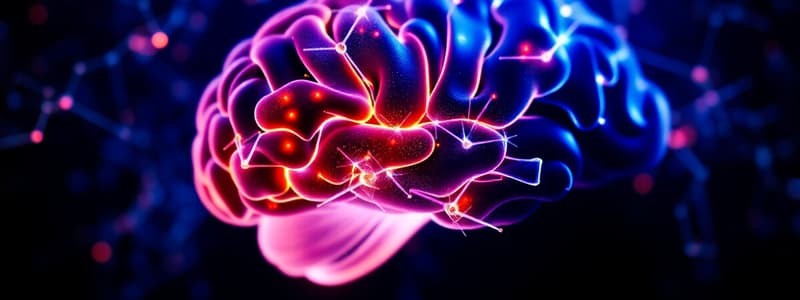Podcast
Questions and Answers
What is attention?
What is attention?
Attention is the taking possession by the mind in clear and vivid form of one out of what seem several simultaneous objects or trains of thought. It implies withdrawal from some things in order to deal with others.
What is implicit memory?
What is implicit memory?
Implicit memory is the taking possession by the mind in clear and vivid form of one out of what seem several simultaneous objects or trains of thought... It implies withdrawal from some things in order to deal with others.
What is short-term memory?
What is short-term memory?
Short-term memory is where memory is recalled without practicing, something that happened recently. It is believed to rely mostly on an acoustic code for storing information.
What is sensory memory?
What is sensory memory?
What is focused attention?
What is focused attention?
What is alternating attention?
What is alternating attention?
What is sustained attention?
What is sustained attention?
What is selective attention?
What is selective attention?
What is semantic memory?
What is semantic memory?
What is episodic memory?
What is episodic memory?
What is procedural "body" memory?
What is procedural "body" memory?
What is working memory?
What is working memory?
What are the types of memory?
What are the types of memory?
What are the functions of communication?
What are the functions of communication?
What are the types of attention?
What are the types of attention?
What are the forms of communication?
What are the forms of communication?
Temperament is:
Temperament is:
What is verbal communication?
What is verbal communication?
From which language did the term communication come? And what did it mean?
From which language did the term communication come? And what did it mean?
What is written communication?
What is written communication?
What is small group communication?
What is small group communication?
What is public communication?
What is public communication?
What is intrapersonal communication?
What is intrapersonal communication?
What is mass communication?
What is mass communication?
What are the temperament types?
What are the temperament types?
What are the advantages of choleric temperament?
What are the advantages of choleric temperament?
What are the advantages of sanguine temperament?
What are the advantages of sanguine temperament?
What are the advantages of phlegmatic temperament?
What are the advantages of phlegmatic temperament?
What are the advantages of melancholic temperament?
What are the advantages of melancholic temperament?
What are the weaknesses of choleric temperament?
What are the weaknesses of choleric temperament?
What are the weaknesses of melancholic temperament?
What are the weaknesses of melancholic temperament?
What are the weaknesses of sanguine temperament?
What are the weaknesses of sanguine temperament?
What are the weaknesses of phlegmatic temperament?
What are the weaknesses of phlegmatic temperament?
What are Maslow's Hierarchy of Needs?
What are Maslow's Hierarchy of Needs?
What are self-actualization needs?
What are self-actualization needs?
What are the needs in the fourth level of Maslow's hierarchy?
What are the needs in the fourth level of Maslow's hierarchy?
What are safety needs?
What are safety needs?
What are love and belongingness needs?
What are love and belongingness needs?
What are physiological needs?
What are physiological needs?
What is psychology?
What is psychology?
What is the scientific method?
What is the scientific method?
Flashcards
Attention
Attention
The mind's focus on one thing while ignoring others.
Implicit Memory
Implicit Memory
Unconscious memories that influence actions.
Short-term Memory
Short-term Memory
Briefly holds information for immediate use.
Long-term Memory
Long-term Memory
Signup and view all the flashcards
Sensory Memory
Sensory Memory
Signup and view all the flashcards
Focused Attention
Focused Attention
Signup and view all the flashcards
Alternating Attention
Alternating Attention
Signup and view all the flashcards
Sustained Attention
Sustained Attention
Signup and view all the flashcards
Divided Attention
Divided Attention
Signup and view all the flashcards
Selective Attention
Selective Attention
Signup and view all the flashcards
Semantic Memory
Semantic Memory
Signup and view all the flashcards
Episodic Memory
Episodic Memory
Signup and view all the flashcards
Procedural Memory
Procedural Memory
Signup and view all the flashcards
Working Memory
Working Memory
Signup and view all the flashcards
Types of Memory
Types of Memory
Signup and view all the flashcards
Types of Attention
Types of Attention
Signup and view all the flashcards
Temperament
Temperament
Signup and view all the flashcards
Verbal Communication
Verbal Communication
Signup and view all the flashcards
Communication Origin
Communication Origin
Signup and view all the flashcards
Types of Verbal Communication
Types of Verbal Communication
Signup and view all the flashcards
Nonverbal Communication
Nonverbal Communication
Signup and view all the flashcards
Functions of Communication
Functions of Communication
Signup and view all the flashcards
Written Communication
Written Communication
Signup and view all the flashcards
Small Group Communication
Small Group Communication
Signup and view all the flashcards
What is attention?
What is attention?
Signup and view all the flashcards
What is implicit memory?
What is implicit memory?
Signup and view all the flashcards
What is short-term memory?
What is short-term memory?
Signup and view all the flashcards
What is long-term memory?
What is long-term memory?
Signup and view all the flashcards
What is sensory memory?
What is sensory memory?
Signup and view all the flashcards
What is focused attention?
What is focused attention?
Signup and view all the flashcards
What is alternating attention?
What is alternating attention?
Signup and view all the flashcards
What is sustained attention?
What is sustained attention?
Signup and view all the flashcards
What is divided attention?
What is divided attention?
Signup and view all the flashcards
What is selective attention?
What is selective attention?
Signup and view all the flashcards
What is semantic memory?
What is semantic memory?
Signup and view all the flashcards
What is episodic memory?
What is episodic memory?
Signup and view all the flashcards
What is procedural memory?
What is procedural memory?
Signup and view all the flashcards
What is working memory?
What is working memory?
Signup and view all the flashcards
What is temperament?
What is temperament?
Signup and view all the flashcards
What is verbal communication?
What is verbal communication?
Signup and view all the flashcards
Where does the term communication come from?
Where does the term communication come from?
Signup and view all the flashcards
Types of communication:
Types of communication:
Signup and view all the flashcards
What is nonverbal communication?
What is nonverbal communication?
Signup and view all the flashcards
What is written communication?
What is written communication?
Signup and view all the flashcards
What is small group communication?
What is small group communication?
Signup and view all the flashcards
Forms of communication
Forms of communication
Signup and view all the flashcards
What is intrapersonal communication?
What is intrapersonal communication?
Signup and view all the flashcards
What is public communication?
What is public communication?
Signup and view all the flashcards
What is dyadic communication?
What is dyadic communication?
Signup and view all the flashcards
What is mass communication?
What is mass communication?
Signup and view all the flashcards
Temperament types
Temperament types
Signup and view all the flashcards
Characteristic (advantages) of Choleric
Characteristic (advantages) of Choleric
Signup and view all the flashcards
Characteristic (advantages) of Sanguine
Characteristic (advantages) of Sanguine
Signup and view all the flashcards
Characteristic (advantages) of Phlegmatic
Characteristic (advantages) of Phlegmatic
Signup and view all the flashcards
Characteristic (advantages) of Melancholic
Characteristic (advantages) of Melancholic
Signup and view all the flashcards
Characteristic (weaknesses) of Choleric
Characteristic (weaknesses) of Choleric
Signup and view all the flashcards
Characteristic (weaknesses) of Melancholic
Characteristic (weaknesses) of Melancholic
Signup and view all the flashcards
Characteristic (weaknesses) of Phlegmatic
Characteristic (weaknesses) of Phlegmatic
Signup and view all the flashcards
Characteristic (weaknesses) of Sanguine
Characteristic (weaknesses) of Sanguine
Signup and view all the flashcards
Maslow's hierarchy of needs (levels)
Maslow's hierarchy of needs (levels)
Signup and view all the flashcards
Self-actualization needs
Self-actualization needs
Signup and view all the flashcards
Love and belongingness needs
Love and belongingness needs
Signup and view all the flashcards
Safety needs
Safety needs
Signup and view all the flashcards
Esteem needs
Esteem needs
Signup and view all the flashcards
Physiological needs
Physiological needs
Signup and view all the flashcards
Study Notes
General Psychology
- Psychology is the scientific study of behavior and mental processes in individuals.
- Psychologists use the scientific method to analyze and solve problems.
- This method is used in all sciences.
- Behavior can be both observable and internal.
Attention
- Attention is the focused concentration of the mind on a specific object, idea or task.
- It involves the selective focus on one thing while ignoring others.
- Attention processes occur within 200-500 milliseconds.
- Attention allows the mind to deal with multiple objects/tasks.
Memory
- Memory involves the storage and retrieval of information.
- Short-term memory holds information for a short time and is primarily acoustic.
- Long-term memory stores information for longer periods, potentially lifetimes.
- Implicit memory is a learned skill, habit or conditioning.
- Sensory memory is the initial recording of sensory information.
Types of Attention
- Focused attention involves responding to distinct stimuli.
- Alternating attention refers to mental flexibility, multi-tasking.
- Sustained attention refers to vigilance over time.
- Divided attention refers to the simultaneous processing of multiple tasks.
Inter-personal communication
- Interpersonal communication involves interaction between two or more people.
- This process involves sharing information and feedback between the sender and receiver.
Types of Communication
- Dyadic communication involves two persons.
- Small group communication involves more than two but a limited number of people.
- Mass communication involves a source and a large audience, there is limited feedback.
- Intrapersonal communication involves self-talk.
Temperament
- Temperament describes innate aspects of personality.
- Example Temperaments include, Choleric, Sanguine, Phlegmatic, Melancholic.
- Choleric people are activists, opportunistic, and fearless.
- Sanguine people are optimistic and enjoy communication.
- Phlegmatic people are peace-loving and even-tempered.
- Melancholic individuals are often introspective and focused on inner thoughts.
Cognitive Processes
- Sensation is the passive process of receiving and detecting stimuli.
- Perception involves actively selecting and organizing sensory information.
- Transduction converts physical energy into neural signals.
Studying That Suits You
Use AI to generate personalized quizzes and flashcards to suit your learning preferences.




